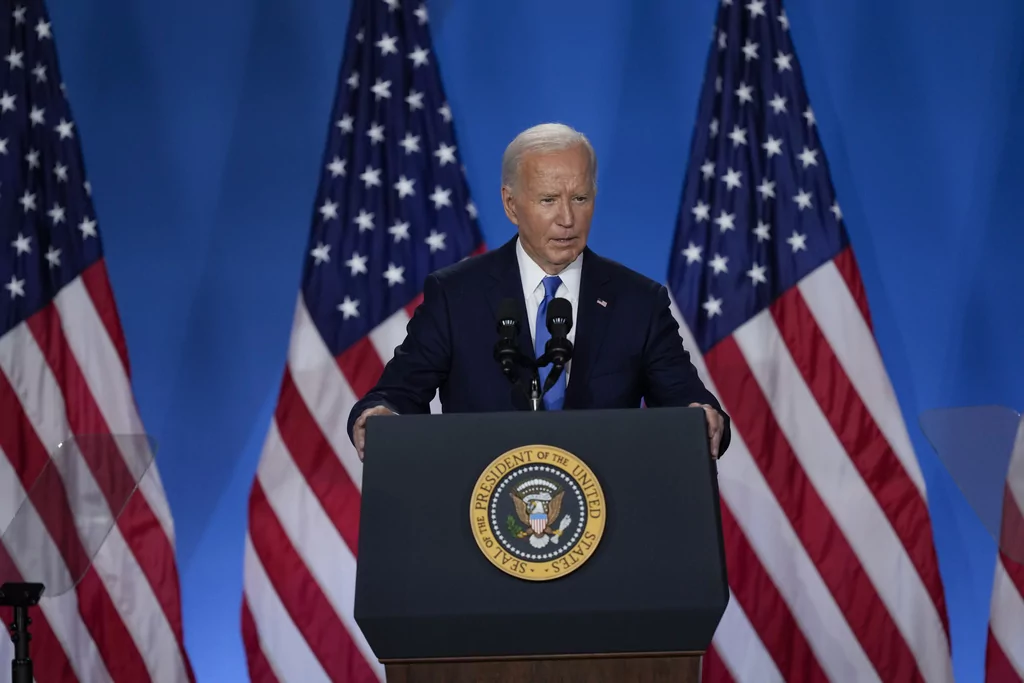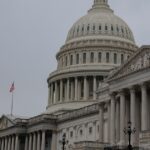

Foreign policy plots
The world looks a lot different in 2024 than it did in 2020. Former President Donald Trump liked to boast about how calm the world was when he was in charge — no war in Ukraine, no war in Israel, and Chinese and North Korean leaders “liked” and “respected” him a lot. President Joe Biden hasn’t had the same international calm as Trump, though he has had the benefit of building and strengthening the international relationships that frayed under Trump’s stinging critiques of neighbors and allies.
Just how important those relationships are has been on display recently. A prisoner swap that released former U.S. Marine Paul Whelan and Wall Street Journal reporter Evan Gershkovich wouldn’t have happened if Biden wasn’t prepared to loop four other countries into the deal — including convincing Germany to release Russian President Vladimir Putin’s favorite hitman.
An effort to strengthen and rebuild bridges that were strained under Trump will be hard to protect, and Defense Reporter Mike Brest took a look at those efforts in the third installment of our series examining the attempt to “Trump-proof” Biden’s legacy.
Unlike reclassifying executive branch employees, passing rules outside the 60-day Congressional Review Act window, and racking up legislative wins to burnish his record, there are few things Biden can do to prevent Trump from making wholesale changes to the country’s foreign policy approach.
“There are some decisions that are irreversible, like starting a war … and I realize presidential regulations and interpretations and statements can take a little bit of time to undo through the court system, but there’s no particular reason to think that anything Biden or any other president could do unilaterally, Trump could not undo unilaterally,” Michael O’Hanlon, the director of research in Foreign Policy at the Brookings Institution, told Mike.
Where hand-trying isn’t possible, Biden could try to lean on putting policies in place that are so popular Trump wouldn’t dream of reversing them — something Mike and O’Hanlon discussed as coming straight out of the former president’s playbook.
“After he lost his reelection bid, then-President Trump announced the U.S. would move its embassy in Israel from Tel Aviv to Jerusalem,” Mike wrote. “Biden did not undo that decision when he came into office.”
“It’s the kind of thing where you could undo it if you came in as a successor, but it seems like a lot of effort with a potential insult to a close friend in the form of Israel,” O’Hanlon told Mike, regarding the embassy move. “And so that is the sort of thing where it’s not just that a successor couldn’t undo it; they just chose not to. Once that kind of a decision was made, it would just be too hard to reverse, even though, in theory, you could reverse it.”
The greatest challenge will come in the form of how the United States continues to work with NATO. Trump styles himself as a great friend and defender of Israel. He has an excellent relationship with Prime Minister Benjamin Netanyahu and is unlikely to pull back U.S. support for the country’s attempts to stamp out Hamas while defending itself from Iranian proxies in the region.
However, he is also on record venting his frustration with NATO countries not meeting their 2% GDP spending requirements on defense. In February, he said Russia could do “whatever the hell they want” to NATO countries that weren’t meeting the spending requirements. And his running mate, Sen. J.D. Vance (R-OH), has been one of the loudest critics of the massive aid packages being sent to Ukraine.
Then there is China. A consensus is growing that the U.S. needs to refocus its efforts on the Indo-Pacific region — both economically and militarily. Short of opening a hot conflict with China, there has been an emphasis on making sure Taiwan feels it is relatively safe from an incursion by its much larger, much more powerful neighbor. That support has come ambiguously from the U.S. It’s also something that Trump has been considering changing.
“I think, Taiwan should pay us for defense,” Trump told Bloomberg News in mid-July. “You know, we’re no different than an insurance company. Taiwan doesn’t give us anything. Taiwan is 9,500 miles away. It’s 68 miles away from China. A slight advantage, and China’s a massive piece of land, they could just bombard it.”
Click here to read more about how the world has changed and what could happen when the next president enters the White House.
Bombshell border plan
Just as it looks like the Biden administration might be getting the southern border under control, it is poised to pull the policy credited with stemming the flood of illegal immigration.
The border crisis has been a weak point in Biden’s and Vice President Kamala Harris’s armor. A particularly dangerous item for Harris, who spent the first days of her presidential campaign trying to rewrite her history as the administration’s “border czar.”
When it became clear how important the problem of illegal immigration was to voters — it routinely ranks as a top three concern along with inflation and the economy — Biden flexed his executive muscles to address it.
But Immigration Reporter Anna Giaritelli wrote for us this morning how that could all change if numbers continue to fall.
“In July, approximately 57,000 migrants were apprehended by the U.S. Border Patrol along the southwest border, according to federal data shared with the Washington Examiner,” Anna wrote. “The figure is the lowest since September 2020, when 54,771 people were arrested during the Trump administration, less than 25% of the 250,000 seen at its historic peak in December 2023.”
“The Biden administration’s sudden success stemming the flow of migrants across the border could come with unintended consequences if it walks back the June executive action that it has credited for slowing illegal immigration and set off a surge of migrants flooding into the country due to the pent-up demand,” she wrote.
The order, which barred migrants from seeking asylum somewhere besides a port of entry, was a massive success.
“The action quickly impacted the number of migrants trying to enter as arrests in June dropped from 117,901 in May to 83,536. July was reported by the Washington Examiner’s sources to be around 57,000,” Anna wrote.
But the plan was always caveated with a floor number that, if reached, would lift the automatic enforcement of the rule. In July, average daily arrests were fewer than 1,850. The “magic number” to snap back the executive order is a seven-day average of fewer than 1,500 arrests per day.
Rolling back the plan that appears to be pushing the arrest total down might be encouraging for the left wing of the Democratic Party, but it could come right before early voting begins. An automatic reversal might wind up leaving a border policy win off the table, as Harris won’t have time to point to the success of the plan and instead will be left holding the illegal immigration bag if arrests and crossings start to go back up without the rule in place.
Click here to read more about the Biden border success and possible reversal.
New from us
The Harris-Walz threat to the First Amendment
Trash-talking Trump and Harris go another round on debates
Tim Walz repeatedly hosted Muslim cleric who celebrated Oct. 7 and shared pro-Hitler website link
Gaza protests poised to dampen ‘Killer’ Kamala’s joy all the way to the DNC
Thwarted Taylor Swift concert terrorist attack shows music venues a top target
States and business groups chart another Supreme Court challenge to EPA emissions rule
Larry Hogan and Angela Alsobrooks debate over when to debate
In case you missed it
Harris campaign retreats on Walz’s military bio
Jack Smith and Donald Trump agree about something
Nancy Pelosi told us how she really feels about Biden’s campaign operation
For your radar
Biden has no public events scheduled.
Harris will speak at a campaign event in Phoenix at 8 p.m. Eastern time.






